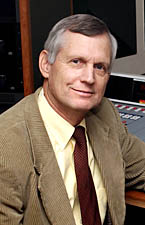Inside Iowa State | ||
Inside ArchivesSubmit newsSend news for Inside to inside@iastate.edu, or call (515) 294-7065. See publication dates, deadlines. About InsideInside Iowa State, a newspaper for faculty and staff, is published by the Office of University Relations. |
November 19, 2004 Radio group poised for changeby Anne Krapfl In the last five years, WOI Radio has evolved from an AM-FM duo to a five-station broadcast group. The addition of FM stations in Fort Dodge (1999), Carroll (2002) and Lamoni (2004) provides public radio coverage to listeners nearly border to border down the mid-section of the state. A license application to the Federal Communications Commission for a station in Ottumwa also is pending. But that's not the end of it. The WOI Radio Group sits poised to join what could become a public radio enterprise. At its December meeting in Ames, the Board of Regents, State of Iowa, will review a proposal, prepared by a Tucson-based consultant hired by the public radio stations on the three regent university campuses (WOI, KUNI/KHKE at the University of Northern Iowa and WSUI/KSUI at the University of Iowa). WOI Radio general manager Bill McGinley said he expects the proposal to be "a strategic outline of what Iowa public radio should look like in the future." That could involve concepts from cooperation to collaboration to consolidation. McGinley supports all those possibilities. "National Public Radio sets the standard for news excellence, for stories and coverage that produce 'driveway moments,'" he said. "It's the engine that drives the growing importance of public radio in the American media marketplace. In Iowa, we're not at that level yet." He said that good programming is expensive, whether you buy programs or produce them yourself. He said he sees a more coordinated Iowa public radio network as a way to improve the quality of local programs and reap financial efficiencies. For example, he noted that at each of the university stations every weekday morning, a reporter-producer serves as local host to National Public Radio's Morning Edition. One host, he said, might handle the local breaks statewide, freeing the others to expand local and regional news coverage. And, until the 2004 session, WOI and KUNI each sent a reporter to Des Moines to cover the Iowa legislative session. Last winter, the two reporters worked as a two-person bureau to send updates to all three campuses. McGinley admits to a historically "competitive dynamic" among the three stations, but said he believes that can be overcome in the interest of better public radio for Iowans. Proactive studyThe stations hired their consultant, Ron Bornstein and Associates, last summer amid repeated conversations at regent meetings about consolidating business functions at the regent universities, but absent a mandate from the board to take action. Other services that are mentioned as candidates for regent-wide systems include internal audit, risk management and transportation services. The radio groupUnlike its counterparts at Iowa and Northern Iowa, WOI Radio now operates without state funds, for which the regents have publicly commended President Gregory Geoffroy. Last fall, in the university's mid-year budget reversion, WOI lost the last $239,000 it received from the university's state appropriation. A year earlier, the station lost $600,000 in state funds, but Geoffroy replaced that with $600,000 in earnings from an endowment set up from the sale of WOI-TV in 1994. McGinley calls the endowment proceeds "a wonderful use of funds to sustain the outreach mission of the university." The WOI stations also receive approximately $170,000 in in-kind annual support from Iowa State in the form of office and studio space in the Communications Building, and such things as utilities and janitorial service. The rest of its $2.7 million budget last year came from other sources, including federal grants, investment income and the growing one, by necessity -- private fund raising. In the spring of 1993, the WOI staff held its first membership drive. The goal, which they made, was1,000 charter members. That fall, they completed their first weeklong, on-air membership campaign. Last year, the station raised more than $1.5 million in private gifts, including $357,000 in underwriting from sponsors and more than $1.1 million from nearly 9,000 members. The station's budget pays for such things as salaries and benefits (25 full- or-part-time staff and about 40 students last year) and national programs such as Fresh Air, Talk of the Nation or Whad'Ya Know? Acquiring the three FM "repeater" stations (essentially unstaffed stations that are fed the WOI signal for rebroadcast) has been accomplished through customized combinations of federal grants, fund-raising matches in the local communities and, in one case, a five-year loan from Iowa State University. WOI transmits its programming via the Iowa Communications Network to the repeater stations at Iowa Central Community College, Carroll High School and Graceland University. Small studios at each site are available for educational use and locally produced programs. What's aheadIf some perceive the radio group's growth as unnecessary empire building, McGinley answers simply, "This business is too important to do a half-hearted job. "The question is, 'How can Iowa better serve public radio listeners? And what can WOI do to get Iowa there?'" |

General manager Bill McGinley of the WOI Radio Group. Photo by Bob Elbert. |
|
Ames, Iowa 50011, (515) 294-4111. Published by: University Relations, online@iastate.edu. Copyright © 1995-2004, Iowa State University of Science and Technology. All rights reserved. |
||